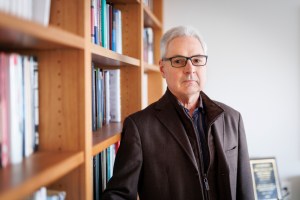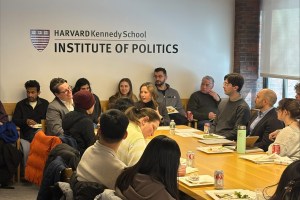Tag: Harvard History
-
Campus & Community
This month in Harvard history
Feb. 20-March 8, 1901 —French literary critic Gaston Deschamps gives a series of eight Sanders Theatre lectures in French on “Modern French Drama,” sponsored by the Cercle Français (French Club).
-
Campus & Community
This month in Harvard history
Feb. 29, 1672 — President Charles Chauncy dies in office. Feb. 10, 1853 — Jared Sparks steps down as President; James Walker, Class of 1814, immediately succeeds him to become Harvard’s 18th President. Feb. 26, 1862 — President Cornelius Conway Felton dies in office. February 1900 — Through the efforts of the Cambridge Cantabrigia Club,…
-
Campus & Community
Plummer, Noble honored at Memorial Church
It was only last year that a crowded room in Salem, Mass., chuckled as the Rev. Professor Peter J. Gomes of the Memorial Church remarked that the city had erected a statue of “Bewitched” actress Elizabeth Montgomery — an irony as her sole relationship to Salem was her role as a TV witch. Salem’s real…
-
Campus & Community
This month in Harvard history
Dec. 29, 1627 — John Harvard enters Emmanuel College, Cambridge University, England.
-
Campus & Community
Renewing a venerable experiment
Even as we absorb the implications of the global financial crisis and plan for how we might react to it, our commitment to provide our undergraduates with an unparalleled academic experience remains as strong as ever. Progress continues with our new Program in General Education and with planning for our ambitious House renewal effort. It…
-
Campus & Community
Sen. Edward M. Kennedy, Doctor of Laws
In one of the his last public speeches before succumbing to brain cancer in August 2009, Senator Ted Kennedy accepted an honorary Doctor or Laws degree from Harvard. President Drew Faust conferred the degree before a standing-room-only audience at Sanders Theatre on December 12, 2008.
-
Campus & Community
Faust presents Kennedy with honorary degree
President Drew G. Faust recalls decades of accomplishments in the life of Senator Edward M. Kennedy. In one of his final public appearances before his death in August 2009, Faust confers upon Kennedy the honorary degree of Doctor of Laws.
-
Campus & Community
Remarks of Stephen Breyer
Stephen Breyer’s remarks at Harvard University’s Convocation, where Sen. Edward M. Kennedy received an honorary degree.
-
Campus & Community
Remarks of Sen. Edward M. Kennedy
Remarks by Sen. Edward M. Kennedy at Harvard University’s 2008 Convocation.
-
Campus & Community
This month in Harvard history
Nov. 14, 1953 — Before several hundred onlookers, the Harvard Engineering Society unveils a plaque on the south tower of Harvard Stadium to mark the structure’s 50th anniversary. Unveiling honors fall to Mrs. George B. de Gersdorff, “whose husband, a member of the Class of 1888, prepared the architectural designs for the Stadium.” (Quoted from…
-
Campus & Community
This month in Harvard history
Nov. 14, 1953 — Before several hundred onlookers, the Harvard Engineering Society unveils a plaque on the south tower of Harvard Stadium to mark the structure’s 50th anniversary. Unveiling honors fall to Mrs. George B. de Gersdorff, “whose husband, a member of the Class of 1888, prepared the architectural designs for the Stadium.” (Quoted from…
-
Campus & Community
Field trip
For well over a century, Harvard and Yale have gone head-to-head at the end of November for the epic football match known simply as “The Game.” The contest is steeped in history and tradition, not just for the undergraduates who take to the field but also for the thousands of students and alumni who descend…
-
Campus & Community
This month in Harvard history
November 1942 — A Harvard Alumni Association advertisement for the well-known Harvard chair (black with gold trim and mahogany-colored arms; weight: 28 pounds; advertised price: $13.50) yields the following historical details: “Many Harvard men know well this famous ‘Freshman’ chair which can be traced far back into the history of the college . . .…
-
Campus & Community
Harvard’s roots: From dirt to display case
Just a year after being pulled from Harvard Yard’s soil, the bones, buttons, pottery shards, and type from the press that printed North America’s first Bible are cleaned up and on display in a new exhibit at Harvard’s Peabody Museum of Archaeology and Ethnology.
-
Campus & Community
This month in Harvard history
Nov. 14, 1899 — In Sanders Theatre, students, faculty, and administrators celebrate Maj. Henry Lee Higginson’s recent $150,000 gift for building the Harvard Union (now part of Barker Center for the Humanities).
-
Campus & Community
This month in Harvard history
Oct. 26, 1952 — Democratic presidential candidate Adlai Stevenson worships at the First Parish Church in Harvard Square and visits President James Bryant Conant afterwards in Massachusetts Hall.
-
Campus & Community
John U. Monro portrait is unveiled at PBH
The Harvard Foundation for Intercultural and Race Relations has unveiled a ninth portrait in its Minority Portraiture Project. The latest honoree on canvas is John U. Monro, former dean of Harvard College. Monro’s portrait, painted by Stephen Coit ’71, was unveiled last week (Oct. 16) in Phillips Brooks House.
-
Campus & Community
This month in Harvard history
Oct. 15, 1945 — Pulitzer Prize-winning History Professor Paul Herman Buck, PhD ’35, becomes Harvard’s first Provost. Under the terms of the statutory amendment approved on this day by the Board of Overseers, the Provost is also, ex officio, Dean of the Faculty of Arts and Sciences (the position Buck has held since 1942).
-
Campus & Community
This month in Harvard history
October 1784 — Harvard awards an honorary Doctor of Laws degree to Maj. Gen. Marie-Joseph-Paul-Yves-Roch-Gilbert du Motier, Marquis de Lafayette.
-
Campus & Community
This month in Harvard history
Oct. 14, 1763 — At the College library in Old Harvard Hall, Ephraim Briggs, Class of 1764, checks out “The Christian Warfare Against the Deuill World and Flesh” by John Downame, one of several hundred books that John Harvard had bequeathed to the College in 1638.
-
Campus & Community
This month in Harvard history
Oct. 17, 1640 — The Great and General Court grants Harvard the revenues of the Boston-Charlestown ferry, which plies the shortest route between Boston and Charlestown, Cambridge, Watertown, Medford, and the plantations of Middlesex County. (From Charlestown, travelers could head for Connecticut.)
-
Campus & Community
This month in Harvard history
September 1951 — Outside Memorial Hall on registration day, WHRB-Radio conducts a new programming feature: sidewalk interviews of freshmen, who explain why they have come to Harvard and what they think of it.
-
Campus & Community
This month in Harvard history
Sept. 1, 1922 — The Divinity School and the Andover Theological Seminary formally begin a closer affiliation under a new agreement approved in the spring.
-
Campus & Community
This month in Harvard history
Sept. 7, 1775 — The “New-England Chronicle or Essex Gazette” advertises that the Harvard Corporation and Overseers have chosen the Town of Concord as “a proper place for convening the Members of the said public Seminary of Learning” as the Revolution rages in Cambridge. Students are due in Concord by Oct. 4; probably less than…
-
Campus & Community
This month in Harvard history
June 1, 1774 — Several parliamentary punishments for the Boston Tea Party (December 1773) take effect, and British troops occupy Boston. “[C]onsidering the present dark aspect of our public Affairs,” the Harvard Corporation votes “that there be no public Commencement this Year.” Ceremonies do not resume until 1781.
-
Campus & Community
This month in Harvard history
June 1766 — Designed by colonial governor Sir Francis Bernard, the new Harvard Hall (still standing, with several later modifications) opens to replace its predecessor, destroyed by fire in 1764.


